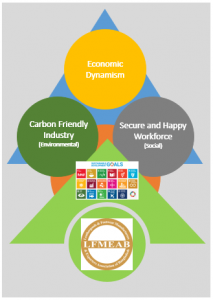About LFMEAB
Leathergoods And Footwear Manufacturers & Exporters Association of Bangladesh (LFMEAB) is an association established and registered in August 2003. At present, a total number of 183 facilities are the member of LFMEAB. The fundamental objective of LFMEAB is to establish a healthy business environment for a close and mutually beneficial relationship between the local manufacturers & exporters of leather footwear & leather goods and buyers.
About Report
LFMEAB have taken the initiative to publish their first Sustainability Report following GRI guidelines, for the period of 2016-2019 (four years) which will be continued to be published every two years ahead. For any details, customers or stakeholders can connect with the Executive Director of LFMEAB in the below-stated address. This report has been prepared in accordance with the GRI Standards: Core option. This report also incorporates The Sustainable Development Goals (SDG), a collection of 17 global goals designed to be a “blueprint to achieve a better and more sustainable future for all” set in 2015 by the United Nations General Assembly and intended to be achieved by the year 2030. The SDG is a part of UN Resolution 70/1, the 2030 Agenda. LFMEAB believes, being an important association working in the leather industry of Bangladesh, it can play a vital role to impose positive changes not only in the context of the country but also globally. The report is published with the help of GIZ- the national team and international consultants.
 From the beginning, LFMEAB has been trying to establish itself as an organization that always looks at the bigger picture. It understands the importance of its input in the leather industry which can prove to be very influential. Now they are working on making this booming sector a sustainable one. So, is has established a sustainability portfolio: Generating profit through promoting People, Planet, Prosperity, Peace and Partnership.
From the beginning, LFMEAB has been trying to establish itself as an organization that always looks at the bigger picture. It understands the importance of its input in the leather industry which can prove to be very influential. Now they are working on making this booming sector a sustainable one. So, is has established a sustainability portfolio: Generating profit through promoting People, Planet, Prosperity, Peace and Partnership.
4.1. Economic Dynamism
The association believes in contributing to a national economic transformation that impacts national economic efficiency & competitiveness and producing quality employment; in a way that compliments both environmental and social sustainability as well as compliments national SDG implementation strategy.
- Revenue growth: reaching $3 billion annual export earnings by 2024 by increasing 70% members and diversifying market presence from the current 106 to 150 countries by 2024.
- Employment generation: targeted export earnings are likely to create more 200,000 jobs.
- National contribution: The sector contributes from the current 4% to 12% of Bangladesh’s total exports which aims 3% of the country’s total gross domestic product (GDP).
- Distinct industry brand promotion: Organizing BLLISS beyond Bangladesh and facilitating Leather Cave and Venus for exportable SME clusters.
4.2. Carbon Friendly Industry
Facilitating Eco-friendly industry initiatives by mobilizing required resources on industry and firm-level that ensure clean supply chains.
- Transparent and responsible traceability: 50% leather sourcing from the Leather Working Group (LWG) certified national factories by 2024.
- Climate protection: Promoting Green commercial (promoting and assisting for using environmentally friendly materials and process) and consumption; by 2024 – implementing ISO 14001:2015 in 40% members; solid waste reduction 45%, biodegradable and sustainable raw materials use 60%; renewable energy 20%.
- Kaizen: Continuous improvement in organizational environmental protection.
- Environmental energy management: Ensure certification of an environmental management system (EMS) for at least 50% members by 2024.
- Product responsibility: Facilitating recycling, reuse, recovery, and remanufacturing
4.3. Secure and Happy Workforce
Creating happy communities by ensuring decent workplaces and with trained and healthy people.
- Healthier workplace in member factories: Occupational health and safety (OHS) practice enhancement 55% by 2024.
- Legal regime: Enforcement of equal opportunity and rights and privilege for the workforce; fair labor practice and community engagement; Being compliant with International Labor Organization (ILO) conventions 95% by 2024.
- Beyond compliance: Under the principle of primary education and basic health for the workforce, operating six Community Schools and three Community Clinics in the industry belt; health and medical insurance coverage up 70% by 2024.
- Women Empowerment: Women’s productivity and empowerment coverage by 60% by 2024.
Data Source:



